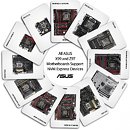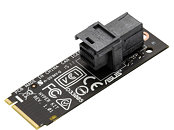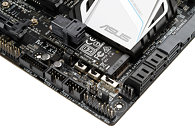Friday, April 17th 2015

ASUS Announces that All its Z97 and X99 Motherboards Support NVMe
ASUS today announced that it is the world's first motherboard brand to support all NVM Express (NVMe) storage devices via a simple UEFI BIOS update and optional ASUS Hyper Kit expansion card.
The free UEFI BIOS update enable all ASUS X99 and Z97 motherboards to be compatible with the latest NVMe storage devices, including those with PCI Express (PCIe) and M.2 (PCIe) interfaces. All ASUS X99 motherboards are also compatible with the latest 2.5-inch NVMe SFF-8639 solid-state drives (SSDs), via the exclusive ASUS Hyper Kit expansion card - for ultimate data-transfer bandwidth up to 32 Gbit/s.NVM Express: The ultra-fast future of PC storage
NVM Express is a new storage architecture that upgrades the popular Advanced Host Controller Interface (ACHI) standard. The new technology eliminates the bottlenecks that constrain the performance of the newest SSD storage devices and improves power-efficiency, driving performance to new extremes and reducing running costs.
Only when connected via NVMe are consumers able to experience the very best performance from the latest-generation SSD storage devices for data-transfers are up to five times (5X) faster than traditional 6Gbit/s SATA connections.
Flexible and easy NVM Express support for all ASUS X99 and Z97 owners
All ASUS X99 and Z97 motherboards offer support for the latest-generation NVMe devices via a fast and simple UEFI BIOS update, applied using the ASUS-exclusive USB BIOS Flashback. This innovative utility downloads the latest UEFI BIOS to a USB flash drive, enabling users to update the award-winning ASUS UEFI BIOS quickly and easily. The motherboard does not even need to have a processor or memory modules in place: users simply connect the power supply, plug in their USB drive, press the USB BIOS Flashback or Reset button and then sit back and wait - there's nothing else to do.
Once upgraded, all ASUS X99 and Z97 motherboards offer full support for both PCIe and M.2 NVMe storage devices. With the optional ASUS Hyper Kit expansion card, owners of ASUS X99 motherboards are free to attach 2.5-inch NVMe storage devices via the SFF-8639 (Mini-SAS HD) connector provided by Hyper Kit. ASUS Hyper Kit can be also purchased separately.
The free UEFI BIOS update enable all ASUS X99 and Z97 motherboards to be compatible with the latest NVMe storage devices, including those with PCI Express (PCIe) and M.2 (PCIe) interfaces. All ASUS X99 motherboards are also compatible with the latest 2.5-inch NVMe SFF-8639 solid-state drives (SSDs), via the exclusive ASUS Hyper Kit expansion card - for ultimate data-transfer bandwidth up to 32 Gbit/s.NVM Express: The ultra-fast future of PC storage
NVM Express is a new storage architecture that upgrades the popular Advanced Host Controller Interface (ACHI) standard. The new technology eliminates the bottlenecks that constrain the performance of the newest SSD storage devices and improves power-efficiency, driving performance to new extremes and reducing running costs.
Only when connected via NVMe are consumers able to experience the very best performance from the latest-generation SSD storage devices for data-transfers are up to five times (5X) faster than traditional 6Gbit/s SATA connections.
Flexible and easy NVM Express support for all ASUS X99 and Z97 owners
All ASUS X99 and Z97 motherboards offer support for the latest-generation NVMe devices via a fast and simple UEFI BIOS update, applied using the ASUS-exclusive USB BIOS Flashback. This innovative utility downloads the latest UEFI BIOS to a USB flash drive, enabling users to update the award-winning ASUS UEFI BIOS quickly and easily. The motherboard does not even need to have a processor or memory modules in place: users simply connect the power supply, plug in their USB drive, press the USB BIOS Flashback or Reset button and then sit back and wait - there's nothing else to do.
Once upgraded, all ASUS X99 and Z97 motherboards offer full support for both PCIe and M.2 NVMe storage devices. With the optional ASUS Hyper Kit expansion card, owners of ASUS X99 motherboards are free to attach 2.5-inch NVMe storage devices via the SFF-8639 (Mini-SAS HD) connector provided by Hyper Kit. ASUS Hyper Kit can be also purchased separately.






24 Comments on ASUS Announces that All its Z97 and X99 Motherboards Support NVMe
oh wait ... it's in the second list ... bah ... okay all :D
Are there differences in maximum speeds depending of if the mobo is a 97 or 99 series?
I read that the Hyper Kit is the fastest, and only for X99 boards?
So what do Z97 owners exactly get in terms of speed, apart from a UEFI update?
NVM (north vietnam militia)
It's quite like how some boards had TRIM support for SSDs, and some didn't. It requires the presence of an Optional Boot ROMinside the BIOS, and that isn't going to be present on devices earlier than Z97 and X99, although we may see some select products with M.2 ports get updates. So, now that all ASUS boards FINALLY have BIOS updates available for their boards with these Op-ROMs, it's a news item.
Because for gamers X99 platform can work years and it's good to support all important features now and in near future. If I play with i7-3770K 3 years with i7-5820K I expect same or more.
Its either 10Gb/s or 20Gb/s from the PCH, as the PCH has PCI-E 2.0 which is at 5Gb/s per lane, so for PCI-E 2.0 from the PCH on both Z97 and X99 then its multiples of 5 and usually 10Gb/s (standard M.2 speed) or 20Gb/s.
Also DMI 2.0 is 20Gb/s which is enough at this moment, on X99 it can be a choke point though, but on Z97 not as bad as on X99.
Then you have PCI-E lanes from the CPU being used for the M.2 slots, that is in multiples of 8Gb/s but those are almost always 4x PCI-E 3.0 for 32GB/s, these slots usually only support PCIe based M.2 drives, but many times the manufacturer might take an SATA lane from the PCH and link it to the slot to provide SATA support as well.
Ehh not much performance loss, Z97 actually has better storage performance than X99 according to many editors I have talked too. However most of them stick a PCI-E card into the board's slot to get the CPU's bandwidth. Also there are some Z97 boards with PCI-E 3.0 based M.2 such as this: www.asrock.com/news/index.asp?id=2121
Then on X99 there are MANY more boards that support 4x PCI-E 3.0 from the CPU, not all of them do however.
But I think the part that guy read was about the hyper kit being provided with X99 motherboards from asus as an option, maybe asus doesn't have 4x M.2 for Z97, but that doesn't mean that is the same for all Z97 motherboards.
So if you buy a PCI-E 3.0 4x riser card for a M.2 SSD... Does it have to be M.2 SATA or M.2 PCI-E interface? (if this matters at all)
Some -Asus- mobos have mPCI-E slot + M.2 slot + Sata Express ports + 2 SATA subsystems (Intel/AMD onchip and Asmedia normally), this is getting a bit crazy!!!!!
It doesn't seem ready for the consumer.